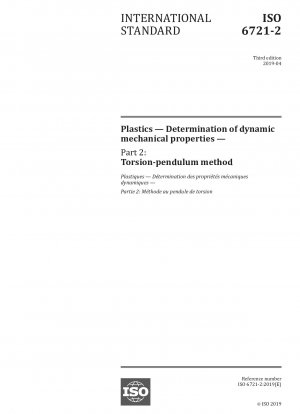ISO 6721-2:2019
Plastics — Determination of dynamic mechanical properties — Part 2: Torsion-pendulum method
- Standard No.
- ISO 6721-2:2019
- Release Date
- 2019
- Published By
- International Organization for Standardization (ISO)
- Latest
- ISO 6721-2:2019
- Scope
- This document specifies two methods (A and B) for determining the linear dynamic mechanical properties of plastics, i.e. the storage and loss components of the torsional modulus, as a function of temperature, for small deformations within the frequency range from 0,1 Hz to 10 Hz. NOTE The temperature dependence of these properties, measured over a sufficiently broad range of temperatures (for example from −50 °C to +150 °C for most commercially available plastics), gives information on the transition regions (for example the glass transition and the melting transition) of the polymer. It also provides information concerning the onset of plastic flow. The two methods described are not applicable to non-symmetrical laminates (see ISO 6721-3). The methods are not suitable for testing rubbers, for which the user is referred to ISO 4664-2.
ISO 6721-2:2019 Referenced Document
- ISO 6721-1 Plastics — Determination of dynamic mechanical properties — Part 1: General principles
ISO 6721-2:2019 history
- 2019 ISO 6721-2:2019 Plastics — Determination of dynamic mechanical properties — Part 2: Torsion-pendulum method
- 2008 ISO 6721-2:2008 Plastics - Determination of dynamic mechanical properties - Part 2: Torsion-pendulum method
- 1995 ISO 6721-2:1994/Cor 1:1995 Plastics - Determination of dynamic mechanical properties - Part 2: Torsion-pendulum method; Technical Corrigendum 1
- 1994 ISO 6721-2:1994 Plastics - Determination of dynamic mechanical properties - Part 2: Torsion-pendulum method
